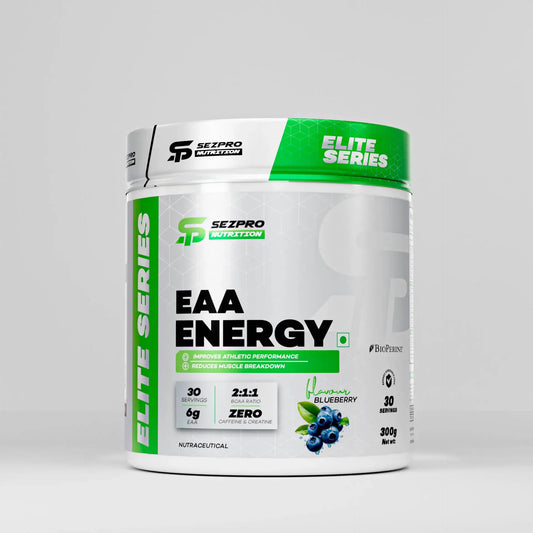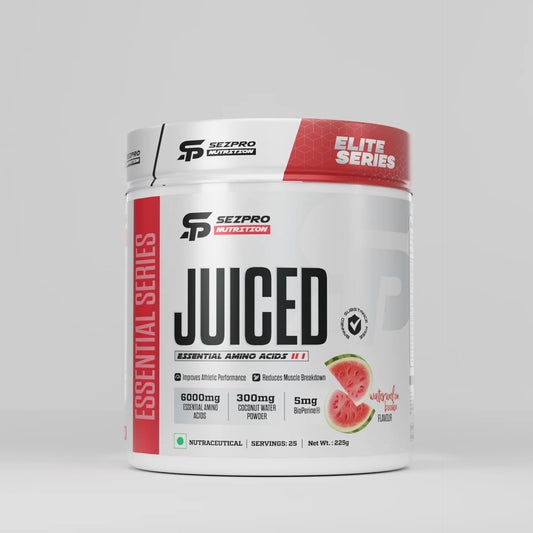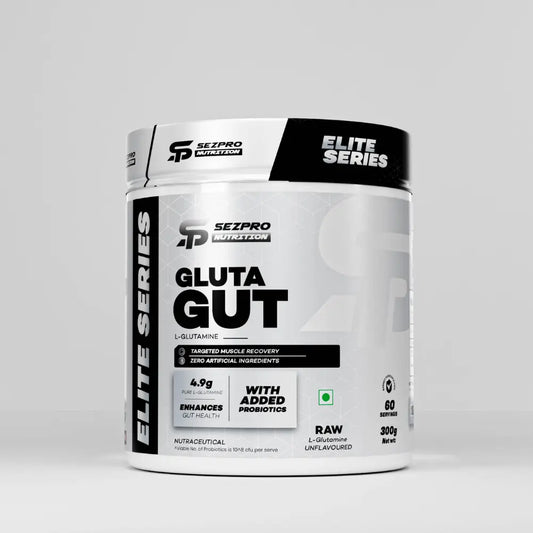Amino Acids
What Are Amino Acids?
Amino acids are organic compounds of carbon, oxygen and nitrogen and serve as the building blocks of proteins. Long chains of amino acids join together to form a protein, which is vital for most of the inner workings of the body as well as for Muscle Building Hence, amino acids are essential for various bodily functions.
These supplements are classified into three main categories: i.e. essential amino acids (the amino acids that cannot be synthesised by our body and have to be consumed through diet to survive), conditionally essential and non-essential amino acids (the amino acids that our body can produce, although sometimes in case of physical coercion, we need to acquire them through food.)Branched-chain amino acids(BCAAs) such as leucine, isoleucine, and valine are formulated to support muscle protein synthesis and help in muscle recovery.
Essential amino acids, including our Branched-chain amino acids, are most popular among athletes and fitness enthusiasts as they support your overall performance.
Benefits of amino acid supplements
Amino acids offer various health benefits that can be beneficial for people who are fitness freaks:
Helps in Muscle Building and Repair: Branched-chain amino acids (BCAAs) are leucine, isoleucine, and valine, which are essential in muscle protein synthesis. Athletes and fitness freaks consume these amino acids to promote muscle growth and recovery from intense workouts.
Enhanced Performance: BCAAs and semi-essential amino acids like arginine are some amino acids that help improve workout performance by reducing fatigue, supporting energy levels, and increasing blood flow to muscles. It is rich in electrolytes, which helps keep the body hydrated during strenuous workouts.
Helps in Fat Loss: BCAAs like leucine and other essential amino acids help lose weight. They promote excess Fat Burning and balance visceral fat that triggers metabolic problems.
Supports a healthy Immune system: Glutamine or L Glutamine is an essential amino acid for a healthy immune system. Glutamine prevents illness and promotes immune function, especially during intense workouts or stress. It provides cytokines (chemical messengers to the immune system) and is an essential nutrient for lymphocytes and macrophages (types of immune cells). Other amino acids also play a vital role and are required for several crucial immunological functions.
Increases Cognitive Function: Some essential amino acids like tyrosine and Tryptophan are precursors to neurotransmitters, help in mood regulation and improve cognitive function. These amino acids support mental well-being and focus. Other than this, amino acids like histidine and phenylalanine are necessary for synthesising neurotransmitters like dopamine, histamine, epinephrine, and norepinephrine.
Recovers and Reduces Muscle soreness: Some amino acids like BCAA and Glutamine help reduce muscle soreness after an intense workout and contribute to faster recovery by supporting muscle tissue repair. The BCAAs help replenish Tryptophan in the brain and mind. No antacids like Tryptophan convert serotonin. This helps in fatigue reduction.
Regulate metabolism: Amino acids like carnitine (composed of essential amino acids- Lysine and methionine) support in transferring fatty acids into cells for energy production and regulate metabolism, which aims at weight management.
Reduce Anorexia and DOMS: BCAA supplement helps in the holistic development of the body. It has been shown to increase nutrients in undernourished or older adults and also helps in ruling out delayed onset muscle soreness.
Used for Medical Conditions: Some essential amino acid supplements are used for medical treatments for specific conditions, including inborn errors of metabolism or effective liver disease.
It’s important to remember that while amino acid supplements can offer many benefits, they should be consumed by consulting with a healthcare professional to avoid adverse effects.
Obtaining amino acids through a well-balanced diet is essential for overall health.
Types of Amino Acids
There are 20 primary amino acids in the body that are divided into Two main types of amino acids that are necessary for overall health:
Essential Amino Acids (EAAs):
- Leucine: This essential amino acid is crucial in muscle growth and promotes protein synthesis. It is one of the three Branched Chain of Amino Acids.
- Isoleucine: It is essential for energy regulation and muscle metabolism. It is one of the three Branched Chain of Amino Acids.
- Valine: Essential amino acids like valine support muscle growth repair and help increase energy production. It is one of the three Branched Chain of Amino Acids.
- Histidine: It is essential for synthesizing histamine, a neurotransmitter and is generally used for medicinal purposes, like allergic reactions, rheumatoid arthritis, anaemia, etc.
- Lysine: This essential amino acid is vital for protein synthesis, tissue repair and immune function. It enhances the production of collagen and calcium retention in the body.
- Methionine: It serves as a precursor for many molecules and is essential for metabolism.
- Threonine: This essential amino acid supports protein balance, immune function and collagen production. Other than that, it is used to treat various nervous disorders.
- Tryptophan: Essential amino acids like Tryptophan are formulated to influence mood and sleep schedule. It also balances the nitrogen levels in the body.
- Phenylalanine: It is vital for producing several proteins and other molecules necessary for multiple bodily functions, particularly beneficial in alleviating pain and addressing skin disorders.
Non-Essential Amino Acids (NEAAs): Some Amino Acids become conditionally essential or semi-essential in case of coercion
- Alanine: It is essential for energy production and helps maintain blood sugar levels.
- Arginine: This non-essential amino acid supports blood vessel dilation, immune function and hormone release.
- Asparagine: This amino acid helps build blocks for protein and is also an essential component of the urea cycle.
- Aspartic Acid: It contributes to energy production and neurotransmitter synthesis.
- Cysteine: This non-essential amino acid is essential for antioxidant production and hair, skin and nail formation.
- Glutamic Acid: This amino acid is a neurotransmitter that stimulates energy metabolism.
- Glutamine: Non-essential amino acids like Glutamine are essential for immune function, gut health and muscle recovery.
- Glycine: It is involved in collagen production and neurotransmitter synthesis.
- Proline: Important for collagen formation and joint health.
- Serine: Involved in synthesizing proteins, nucleotides, and other amino acids.
- L-Serine: It is an alcohol-containing amino acid. Serine or L-Serine has functions in protein synthesis, neurotransmission, folate and methionine cycles and synthesis of sphingolipids, phospholipids, and sulphur-containing amino acids.
- Tyrosine: It is an uncharged, hydrophobic and aromatic amino acid. It may help improve alertness, attention, and focus. Depending on the dose, It operates as a recipient of phosphate groups transferred through protein kinases.
These essential and non-essential amino acids are formulated to support muscle building, recovery or overall wellness, but you should always consult a healthcare professional before consumption.
When to Consume Amino Acids?
Before Exercise (Pre-Workout): Consumption of amino acids, especially branched-chain amino acids (BCAAs), before a workout may help support energy levels, reduce muscle protein breakdown, and enhance endurance.
During Workout: Consuming essential amino acids during your workout session benefits your performance during intense exercise.
After Exercise (Post-Workout): Consuming amino acids such as BCAAs and essential amino acids helps in muscle recovery and protein synthesis.
Between Meals: Consuming amino acid supplements between meals helps to support overall protein intake throughout the day.
Before Bedtime: Consuming amino acid supplements helps muscle repair and recovery overnight.
Recommended usage can vary, so it is advisable to consult with a healthcare professional before consuming any supplement or essential amino acid supplement.
What are some of the precautions that should be taken while consuming and choosing your Amino Acids?
Allergens- If you are allergic to certain things, check the ingredients list to look for allergens or other substances that will not suit your body.
Authenticity- Make sure all the ingredients added to your product are authentic.
Certifications- Check for certifications when buying any product, and avoid using third-party or fake products.
Dosage and Type- Check the ingredients list to choose the right type of amino acid supplement in accordance with your body and health.
Individual Compatibility - Monitor your body. In case of discomfort or unfavourable symptoms, discontinue immediately and contact your physician.
Consultation- If you have any health condition, contact a physician or nutritionist to find the most suitable match.
How to use Amino Acids Supplementation?
You can consume an essential amino acid supplement with water or any other beverage of your choice at any time of the day, ideally during or before your workout session. It is recommended to consult with a healthcare professional before taking essential amino acids with other supplements.
Where to buy Amino Acids?
At SezPro Nutrition, you can get some of the essential amino acids and glutamine supplements at a reasonable rate that can benefit people who are fitness enthusiasts.
Visit our site, Sezpronutrition.com, for amino acid supplements at a cost you won’t miss.
Which is the Best Amino Acid?
Here are two essential amino acid supplements that can be beneficial for athletes, bodybuilders and fitness lovers:
EAA Energy: Sezpro Nutrition Essential Amino Acid(EAA) energy contains 6g Eaa and 2:1:1 bcaa ratio with caffeine that helps reduce muscle breakdown and improves athletic performance.
Gluta gut L- Glutamine: Sezpro nutrition Gluta gut is formulated with 4.9 g of pure L- Glutamine with added probiotics that help muscle recovery and enhance gut health.
FAQs About Amino Acids.
What is the difference between essential and non-essential Amino Acids?The body does not produce essential amino acids obtained through diet or supplements. Acids like leucine, lysine, valine, and Tryptophan are some common crucial amino acids.
The body can produce Non-essential amino acids even if the dietary sources are insufficient; examples of non-essential amino acids include alanine, aspartate and glutamic acid. However, some non-essential amino acids may become semi-essential in case of coercion and will be called conditionally essential amino acids, e.g., arginine.
When is the optimal time to consume Amino Acid Supplements?
You can consume an amino acid supplement at any time of the day. To enhance your stamina and endurance during workouts, one should prefer taking them before or during the workout. You can also take amino acids post-workout to boost the recovery process.
Can I take Amino Acid Supplements without exercise?
You can take amino acid supplements like BCAAs and EAAs without physical workouts. Still, consuming them with an active lifestyle is recommended to promote new muscle growth and faster results.
Who should avoid Amino Acids?
Infants, children, adolescents, pregnant and lactating women and older people should avoid consuming amino acid supplements as they might experience some adverse effects from ingestion of particular amino acids.
What does an Amino Acid supplement do?
Amino acid supplements help to increase muscle mass and decrease fatigue. Consuming amino acids supports the immune system, improves memory, and reduces headaches and depression.




